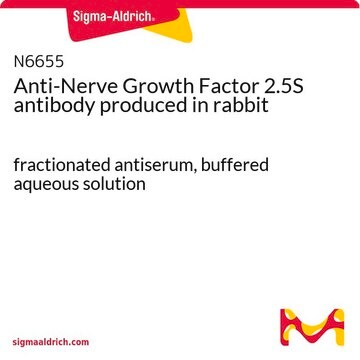N3908
Anti-Nerve Growth Factor Receptor (NGFR p75) antibody produced in rabbit

affinity isolated antibody, buffered aqueous solution
Synonym(s):
NGFR Antibody - Anti-Nerve Growth Factor Receptor (NGFR p75) antibody produced in rabbit, Ngfr Antibody
About This Item
Recommended Products
biological source
rabbit
conjugate
unconjugated
antibody form
affinity isolated antibody
antibody product type
primary antibodies
clone
polyclonal
form
buffered aqueous solution
species reactivity
rat
enhanced validation
functional assay
Learn more about Antibody Enhanced Validation
technique(s)
immunohistochemistry (frozen sections): 1:10,000 using rat brain
indirect immunofluorescence: 1:500 using NGF-treated PC12 cells
microarray: suitable
western blot: 1:5,000 using whole cell extract of NGF-treated PC12 cells
UniProt accession no.
shipped in
dry ice
storage temp.
−20°C
target post-translational modification
unmodified
Gene Information
rat ... Ngfr(24596)
General description
Immunogen
Application
- immunoprecipitation
- immunocytochemistry
- immunohistochemistry
- immunoblotting
Biochem/physiol Actions
Physical form
Disclaimer
Not finding the right product?
Try our Product Selector Tool.
related product
Storage Class Code
10 - Combustible liquids
WGK
WGK 3
Flash Point(F)
Not applicable
Flash Point(C)
Not applicable
Certificates of Analysis (COA)
Search for Certificates of Analysis (COA) by entering the products Lot/Batch Number. Lot and Batch Numbers can be found on a product’s label following the words ‘Lot’ or ‘Batch’.
Already Own This Product?
Find documentation for the products that you have recently purchased in the Document Library.
Our team of scientists has experience in all areas of research including Life Science, Material Science, Chemical Synthesis, Chromatography, Analytical and many others.
Contact Technical Service








